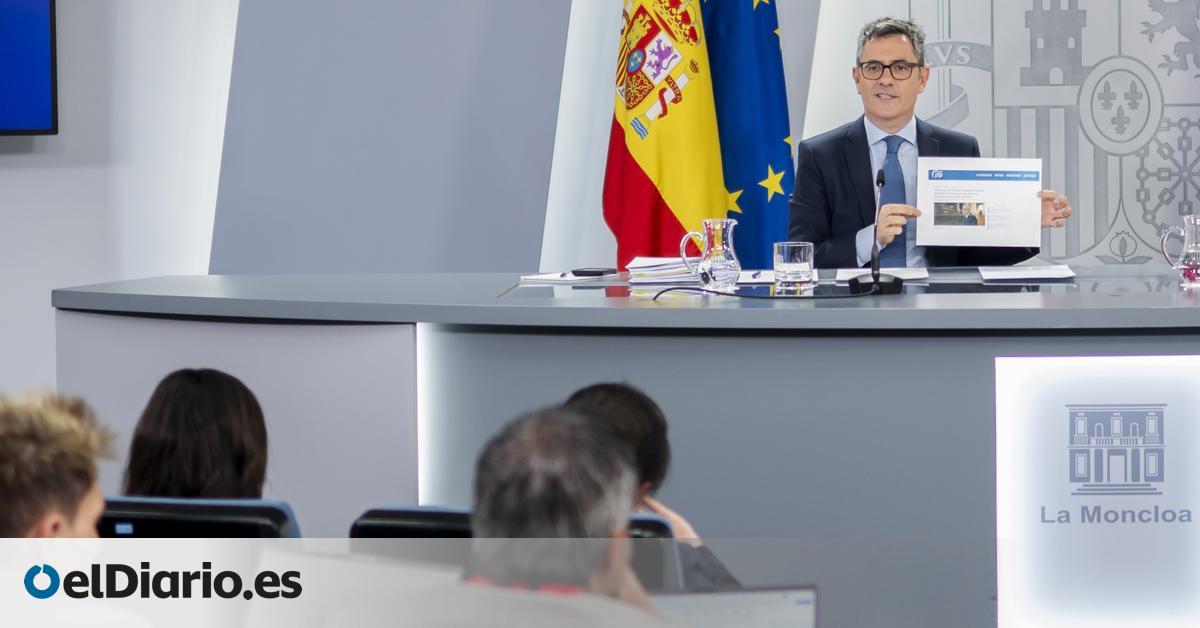
The Government advances in the armomic of the autonomy of the Prosecutor’s Office regarding the Executive Power. The Council of Ministers has approved on Tuesday a reform of the Organic Statute of the Fiscal Ministry that establishes that the mandate of the State Attorney General will be five years and will no longer coincide with that of the Government, while attributing exclusively to the maximum representative of the Public Ministry the power to appoint, ascend or sanction prosecutors, as stated in the text to which Eldiario.es has had access.
Likewise, the draft seeks to strengthen the “independence” of the Prosecutor’s Office by expressly prohibiting that the central government or those of the autonomous communities request to promote any type of action in specific procedures. It also eliminates the possibility that the attorney general can be called to appear in the Council of Ministers and establishes that their communications with the government are public and in writing.
In the press conference after the Minister of Minister, the Minister of Presidency, Justice and Relations with the Cortes, Félix Bolaños, has affirmed that this reform will not enter into force until 2028 and, consequently, will not affect the current State Attorney General, Álvaro García Ortiz. “This reform will affect the attorney general to leave the polls in 2027 [cuando se celebrarían las siguientes generales si no hay adelanto electoral]. It is a long -term reform (…). It has nothing to do with any current issue, ”he said.
The drafting of a new statute for the Prosecutor’s Office was foreseen in the Reform of Reform of the nineteenth Criminal Procedure Law (LECrim) that the Executive presented in November 2020 and whose parliamentary process will begin after summer after receiving the reports of the advisory bodies. This reform includes a transfer of functions of judges to prosecutors, who will direct the investigations and to decide the steps to take to clarify who has committed a crime. And, consequently, it required a reform of the statute to strengthen the impartiality and objectivity of the prosecutors that Bolaños has described as “structural” and “absolutely necessary.”
Until now, the Government had not specified that these changes would be translated into the main rule of the Prosecutor’s Office. The draft also arrives at a convulsive moment in the Public Prosecutor’s Office, with the current attorney general charged after the complaint presented by Isabel Díaz Ayuso and with the most conservative wing of the Prosecutor’s Office openly facing him. In its agreement to renew the General Council of the Judiciary (CGPJ), the Government also committed to the PP to reform this rule.
Five years of mandate
The group of states against corruption of the Council of Europe (Greco) has been requesting Spain in recent greater guarantees in relation to the reinforcement of independence, transparency and autonomy of the Fiscal Ministry. One of these recommendations is that the mandate of the State Attorney General does not coincide with that of the Government, which is in charge of his election. The new statute increases from four to five years the mandate of the attorney general, which will remain non -renewable except in case the position has held for less than a year (now is for two). In addition, if the attorney general ceases before his mandate is fulfilled, the new will have a mandate that will not exceed the time that was ceased to exhaust those five years.
The draft also includes developments in the cessation regime. Thus, it establishes that the dismissal “due to serious or repeated non -compliance with its functions” can only be applied prior report of the CGPJ “in order for this cause not to protect discretionary cessations that annul the effects of the reform,” explain sources from the Ministry of Presidency, Justice and Relationships with the Courts.
The reform also regulates the relationship of the attorney general with the Executive, which according to the current writing can be addressed to him to ask him to promote actions in defense of the public interest or that he accounts for a specific investigation. The institution, however, is not obliged to comply with these requests although it does have to respond to the Executive about its viability or origin with a “reasoned” resolution. The ultimate decision, therefore, has the State Attorney General.
The new text expressly prohibits that the central government or those of the Autonomous Communities request that the Fiscal Ministry promote any type of action in specific procedures. And, in addition, it eliminates the possibility that the Attorney General may be called to appear in the Council of Ministers. In fact, it establishes that its communications with the government must be in writing, published and registered.
Unlike what happens with the judges, in the current regulation prosecutors cannot be challenged, although they have the obligation to depart in those lawsuits in which they are affected by the causes that the Organic Law of the Judiciary establishes for judges and magistrates. The different parts of a procedure can go to a hierarchical superior and ask that a prosecutor not participate in a cause invoking those reasons.
The new standard sets a regime for the abstention and challenge of prosecutors, which will be the same as that of judges and magistrates regulated in the aforementioned law and ranging from being married to any of the parties or having held a position in which it has had “knowledge of the object of the litigation” and an opinion could be formed “to the detriment of due impartiality”.
Appointments and promotions
The new statute attributes to the Attorney General the appointment, promotion and sanctions of the main prosecutors. In the current model it is the Attorney General who makes these proposals to the Government, after listening to the Fiscal Council. The conservative majority of this body – where the vowels of the Association of Prosecutors dominate – have been very critical of the designations of García Ortiz and the Supreme has failed against the decision to ascend to its predecessor, Dolores Delgado.
The draft also includes new measures to resolve discrepancies with the criteria taught by the Attorney General. The Public Ministry is a hierarchical institution in which lower rank prosecutors are subject to the principle of “action unit” and “hierarchical dependence.” However, there are also safeguards for cases where a lower discrepe from its boss’s decision for understanding that the instruction received is “contrary to laws” or “inadmissible” for any other reason.
Thus, article 27 allows the Board of Prosecutors to be submitted – the main advisory body of the State Attorney General – the discrepancies with the orders of its bosses. However, the attorney general still has the last word. Now, the new statute reinforces the role of the Board of Prosecutors of the Chamber, which may impose its criteria on that of the Attorney General if it is supported by at least the three fifths of its members. This body that forms the dome of the fiscal career recently spoke on the application of amnesty to the crime of embezzlement or investigation to two prosecutors in the case of filtration of an email from the Ayuso couple.
Opposition trainers
On the other hand, the new text also puts the focus on the figure of prosecutors who exercise as apprehensive trainers to enter the race. And does so by demanding “in any case” the granting of an authorization by the State Attorney General’s Office. Until now, the prosecutors who exercised this activity were obliged to inform through an instruction, but the intention is to shield this forecast by law by including it in the statute. In addition, it establishes the creation of a public registry of the prosecutors responsible for preparing oppositions. This registry will depend on the State Attorney General’s Office. These same forecasts also appear in the new law that regulates access to the race and that this Tuesday returns in the second round to the Council of Ministers.
An investigation carried out by eldiario.es revealed that many trainers did not report despite exceeding annual training hours (set at 75), and that many of them, in addition, met their students metallic, with which the Treasury has impossible to detect whether it is taxed by that income or that flow of money remains in the submerged economy. In parallel, the draft prohibits all types of sponsorship or private subsidy for professional associations of prosecutors and establishes that the registration of these associations will depend on the State Attorney General’s Office.
Source: www.eldiario.es

